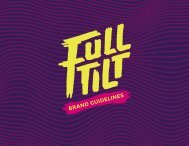Dimension
Taking you beyond the small screen, Dimension is an entertainment magazine for people who want to think critically about their TV.
Taking you beyond the small screen, Dimension is an entertainment magazine for people who want to think critically about their TV.
You also want an ePaper? Increase the reach of your titles
YUMPU automatically turns print PDFs into web optimized ePapers that Google loves.
quirk than a defining characteristic of his personality. He’s<br />
deeply flawed, haunted by his past, and, as Colter says,<br />
might pick up women at a funeral. But that’s precisely<br />
what makes him so heroic. He’s working on it, struggling<br />
to accept himself in the face of a world that keeps pushing<br />
him toward invisibility. “So many times, black protagonists<br />
have to be holier than thou, but he’s not an angelic figure,”<br />
says John Singleton, the Boyz n the Hood director and a<br />
friend of Coker’s. “It’s the right time for this kind of hero.<br />
He’s so needed in the world.”<br />
WITH COKER’S COMIC-GEEK background<br />
underpinning his years of experience in TV and film,<br />
the role of Luke Cage showrunner fits him as snugly as<br />
a Spidey suit. But where Marvel’s superheroes tend to<br />
stumble into their powers by accident — radioactive spider<br />
bites, misbegotten nuclear tests — Coker didn’t have to<br />
wander into a malfunctioning laboratory to acquire his<br />
skills. He’d been actively accumulating them for decades.<br />
Coker started reading fantasy novels after his parents<br />
divorced and his mother went back to college and then<br />
law school. She usually brought Coker with her to the<br />
library, enforced quiet time that sparked a love of reading.<br />
When Coker was 10, a friend showed him a copy of<br />
Wolverine, the beginning of a seminal story arc written<br />
by Chris Claremont and arted by Frank Miller. The story<br />
starts with Wolverine sadly killing a grizzly bear, then<br />
goes on to depict a battle between the superhero and his<br />
fiancée’s yakuza father — a saga of regret and doubt, not<br />
just Technicolor beat-’em-up. Coker keeps all four issues<br />
of the series in his LA office for inspiration. “They were<br />
saying yes, this is an adolescent pastime, but that doesn’t<br />
mean we can’t imbue it with a sophisticated worldview,”<br />
he says of its creators.<br />
Comics didn’t just provide great stories but also a target<br />
for Coker’s obsessive tendencies, a wealth of back issues,<br />
in-jokes, and cross-references to hunt down and untangle.<br />
He had a similar response when his cousins introduced<br />
him to hip hop in the mid-1980s. Over time he came<br />
to think of it as superhero music. “It’s the attitude,” he<br />
says. “When I heard the Wu-Tang Clan, I always saw<br />
Captain America and the Avengers assembling as the<br />
camera swoops in.”<br />
Coker had his first chance to meet some of his heroes<br />
as an undergraduate writer for The Stanford Daily,<br />
where he conducted interviews with rappers like Ice<br />
Cube, KRS-One, and Ice T. Before he graduated, he was<br />
writing freelance articles for The Source, Vibe, and others,<br />
becoming an acclaimed and prolific member of the first<br />
wave of hip hop journalists. Over time, Coker began to<br />
see more parallels between the rappers he covered and the<br />
comics he loved. Like Marvel superheroes, rappers often<br />
had to navigate between their public personae and their<br />
private selves. During an interview for Vibe, Christopher<br />
Wallace told Coker that he lived a double life even before<br />
he became the rapper Notorious B.I.G.; to his mom he<br />
was “Chrissie-poo,” an innocent homebody, but when<br />
he sneaked out to sell drugs on the street corners, he was<br />
known as “Big Chris.” He even kept a spare outfit on the<br />
roof of his apartment building so he could change out of<br />
his school clothes without his mother realizing — a detail<br />
that reminded Coker of Spider-Man’s efforts to keep his<br />
superhero identity a secret from his aunt May.<br />
Eventually, Coker took<br />
up screenwriting. He was<br />
inspired in part by his uncle,<br />
Richard Wesley, who<br />
wrote the scripts for such<br />
landmarks of black cinema<br />
as Uptown Saturday Night<br />
and Native Son. Together,<br />
they wrote a fictionalized<br />
version of Tupac Shakur’s<br />
murder, called Flow. The film never got made, but it won<br />
Coker attention. Soon he was adapting Unbelievable, his<br />
biography of the Notorious B.I.G., into the feature film<br />
Notorious. That led to other work, including a job as a<br />
writer and coproducer for the Peabody- winning series<br />
SouthLAnd, under legendary showrunner John Wells, and<br />
later a stint as coexecutive producer on Showtime’s Ray<br />
Donovan; he calls the respective experiences “my graduate<br />
degree and my PhD.”<br />
It was around 2014, when Coker was doing a round of<br />
touch-ups on the screenplay for Straight Outta Compton,<br />
that Marvel started looking for a showrunner for Luke<br />
Cage. From the beginning, says Jeph Loeb, head of<br />
Marvel’s television division, the company was looking<br />
for someone who could not only entertain but also address<br />
issues of race: “What is going on in this country for blacks<br />
and whites, and how can we tell that story through the<br />
eyes of a superhero?” Marvel was in the midst of expanding<br />
its roster of nonwhite superheroes, including introducing<br />
a Muslim Ms. Marvel and a Latino Spider-Man.<br />
The company has since hired Ta-Nehisi Coates, author<br />
of the best-selling Between the World and Me, to pen the<br />
newest adventures of Black Panther, the supergenius ruler<br />
of a fictional African nation. (That character will soon<br />
appear in a film directed by Ryan Coogler, who helmed<br />
Fruitvale Station, about a victim of police violence, and<br />
Creed, the heroic saga of Apollo Creed’s son.) Still, this<br />
was Marvel’s first attempt to create a series or film with<br />
a black protagonist at its center, a responsibility that Loeb<br />
took very seriously. “If we can get one person to watch<br />
the show and to think differently about what it is to be<br />
a hero in the present day, and what it is to be a black hero,<br />
then that’s a victory,” he says.<br />
At his first meeting with Marvel, Coker brought a photograph<br />
of his grandfather, a Tuskegee Airman who had<br />
been awarded the Distinguished Flying Cross. “I talked<br />
about him being from Harlem,” Coker says. “Walking<br />
up the boulevards, you’d see Duke Ellington and Chick<br />
Webb and Lionel Hampton, just walking around. You<br />
saw superheroes every day.” Initially, Coker saw Luke<br />
Cage exploring a similar dynamic, the pressures of a<br />
known superhero operating in the real world, but Marvel<br />
wanted Cage to grow into his role as a superhero, not to<br />
The main reason people<br />
don’t speak out, their main<br />
fear, is getting shot. So what<br />
happens if someone is bulletproof?<br />
What happens if you<br />
take that fear away?<br />
DIMENSION 31





